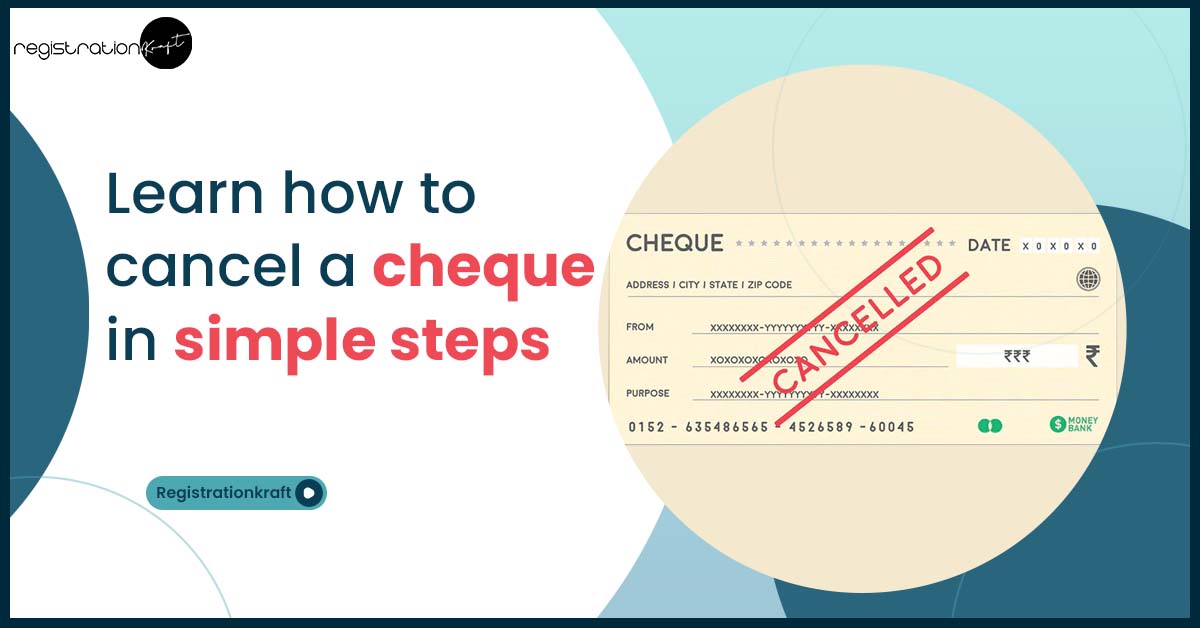In any significant financial dealings even in today’s world of digital transactions, plastic currency and cashless transactions, the Cheque reigns supreme as it possesses all these qualities to a huge extent. It is a type of form that the bank issues to the individual on demand. The individual issues it to the concerned and the bank on receiving it is deemed to pay in cash /transfer the said amount from the individual’s account to the concerned person or organization.
A Cheque serves as the most secure option since no hard cash is involved during the transfer process. There are three parties involved in the transaction – the drawer, the bank and the payee. The transaction is said to be completed only when the amount is either paid or transferred from the payee’s account to the drawer by the bank. Knowing how to cancel a cheque becomes not only a practical necessity but also a measure of financial wisdom. Before we delve into the steps on how can i cancel a cheque, let’s understand the main features, advantages and limitations of a cheque.
Main Features of a Cheque
- A cheque is a certified unconditional order
- The payment to the cheque is made either in the form of cash or transfer
- It is given in the name of an individual or an organization or bank and is liable for payment either in cash or through transfer
- The amount authorized cannot exceed the balance in the account
- This cash amount or cash transfer is paid to the person mentioned
- Account holder(s) is/are authorized to sign on the cheque and it is compulsory.
Advantages of issuing cheques
- It is safer and more convenient to carry around than cash
- It can be easily traced if lost or misused
- It is a negotiable instrument that can be authorized in favour of a third party.
Limitations
- Payments through cheques are to be honoured due to many reasons such as signature verification, personal identity etc.
- Possessing a bank account is mandatory for transactions through cheques
- You need to visit the bank often for transactions through cheques and it is time-consuming.
- Rules and regulations pertaining to cheques are liable for changes as per the norms of the bank.
Types of Cheques
Cheques are classified into different types based on the purpose for which they are issued. Notable amongst them are conventional bearer Cheque that does not require any authorization to make payment, a high-risk blank check where no details are furnished.
A crossed cheque ensures that the amount is credited in the account only whereas a postdated cheque is intended to meet the financial obligation.
Must Read: Things to Consider When Opening a Bank Account
How Can I Cancel A Cheque?
Cancelling a cheque is a financial move that carries significant importance in ensuring the security and integrity of one’s financial transactions. Many reasons may cause a cheque to be cancelled. It could be as simple as a simple spelling mistake or as complex as bringing a change in payment patterns.
Prior knowledge of how to cancel a cheque is very important. People transacting through cheques must be aware of these laid down procedures of the bank. To effect cancellation of cheque leaves, an individual needs to strike two lines across the cheque and write the word “CANCELLED” across it.
The customers need not sign the cancelled cheque. This process if followed carefully, can prevent unauthorized use, rectify errors, and contribute to the overall security of one’s financial assets.
Reasons To Cancel A Cheque
Every individual must understand the reasons behind cheque cancellation, the potential consequences of mishandling the procedure, and the necessary precautions to take will empower individuals to navigate this financial task with confidence.
There could be many reasons to cancel a bank cheque. It may be due to minor mistakes, or noticing a deceit or a scam. The Individual must immediately inform the bank officials of the complete details regarding the date, time and place. Nowadays 24X7 toll-free numbers are also available with an automatic answering system that records the complete events and does necessary action. As the cancellation leads to inconvenience to all the three contending parties i.e. payee, receiver and the bank, prior to cancellation the individual must be cautious to identify the need for cancellation, gather relevant information, contact the Bank, and verify account details.
Keeping these precarious issues in view most banks insist on a written request to cancel the cheque. Some banks may charge a fee for cancelling a cheque. The amount varies, and it is essential for account holders to be aware of any associated costs. These fees are often in place to deter frivolous cancellations and cover administrative expenses.
Even after issuing cheques, the individual can request for Stop Payment Request to prevent the cheque from being cashed. This could be due to various reasons, such as a dispute with the payee or a change in financial circumstances. Relevant details pertaining to an individual’s account such as the account holder’s name, branch name and address, account number, IFSC code, and MICR code on the cheque also serve as proof of having an account in the bank.
By following these steps thoroughly, individuals can navigate the bank cheque cancellation process efficiently, thereby contributing to the security and integrity of their financial transactions.
Various Purposes Of A Cancelled Cheque
- It helps a verifier/auditor to confirm these details of the individual as all the primary details of the bank account are present in a cancelled cheque, a cancelled cheque doesn’t necessarily require a signature on it. Hence there are no security issues that are to be concerned about when it is submitted as proof of your financial identity.
- The bank requests for a specimen of a cancelled cheque when you approach them for a loan such as a car loan, home loan, personal loan, or loan against property with them. Many banks consider it a valid document to prove their identity.
- The service provider insists on a cancelled cheque when you are investing in the stock market such as the National Stock Exchange or the Bombay Stock Exchange,
- To verify a person’s banking and financial profile, many organizations request cancelled cheques for verification of bank accounts.
- When you invest in mutual funds as per government rules, you need to provide a cancelled cheque as proof of your bank account to the seller to credit the dividend & sundries if any, received through your mutual fund investments directly.
Few Final Thoughts
In the busy landscape of financial instruments, bank cheques still remain a committed and secure method of transferring funds. Understanding the effects of their issuance, uses, and the process of cancelling a cheque is necessary for individuals and businesses alike. As financial landscapes are ever expanding, individuals must be equipped with the knowledge and confidence to manage their transactions securely and make the cancellation of a cheque a crucial skill in financial management.
While the security and reliability they offer are supreme, account holders must be aware of the potential consequences and the correct procedures for cancelling a cheque when the need arises. In the present busy world where technology continues to advance, it is interesting to note how traditional instruments like bank cheques still rule the roost to meet the demands of an ever-changing financial world.
A caution of advice for all the individuals is if you fail to keep a check on the issue of cheques you become a postdated cheque issued by a collapsible bank

